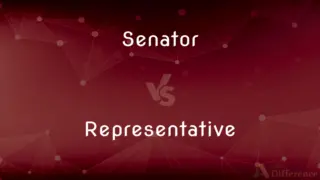Particle vs. Molecule — What's the Difference?
Edited by Tayyaba Rehman — By Fiza Rafique — Updated on September 20, 2023
A particle is a small bit of matter, while a molecule is two or more atoms bonded together.

Difference Between Particle and Molecule
Table of Contents
ADVERTISEMENT
Key Differences
Both particle and molecule refer to components of matter. A particle is a general term that denotes a small bit or portion of something, often used in the context of substances. A molecule, however, is more specific and refers to two or more atoms that are chemically bonded together.
Considering their scope, the word particle can describe anything from subatomic particles, like electrons and quarks, to larger fragments like dust or sand. A molecule, conversely, is particularly about the combination of atoms, such as the molecule of water (H₂O), comprising two hydrogen atoms and one oxygen atom.
The realm of science, especially physics and chemistry, frequently employs both terms, particle and molecule. While particles can be found in various fields, molecules are predominantly a topic of study in chemistry, which delves into their formation, interaction, and properties.
Technological advancements have enabled scientists to observe both particles and molecules directly. Particle accelerators, for instance, explore the mysteries of the tiniest particles. Molecular biology and chemistry, on the other hand, study molecules' role in life processes and chemical reactions.
In day-to-day language, particle often alludes to a minute piece or fragment of a substance, while molecule is typically used in scientific or technical discussions, symbolizing the basic units of chemical compounds.
ADVERTISEMENT
Comparison Chart
Definition
A small bit or portion of matter.
Two or more atoms bonded together.
Scope
Can range from subatomic to larger fragments.
Specifically refers to bonded atoms.
Field of Study
Physics, chemistry, and more.
Mainly chemistry.
Examples
Electrons, quarks, dust particles.
Water (H₂O), methane (CH₄).
Common Usage
Refers to small fragments or bits in general context.
Used in scientific contexts to denote chemical compounds.
Compare with Definitions
Particle
A tiny amount or speck.
There wasn't a particle of truth in his statement.
Molecule
Two or more atoms chemically bonded together.
A molecule of oxygen consists of two oxygen atoms.
Particle
A minute portion of matter.
Dust particles floated in the sunlight.
Molecule
A component of compounds and elements.
The methane molecule contains one carbon and four hydrogen atoms.
Particle
A subatomic component of an atom.
Electrons are negatively charged particles.
Molecule
A group of atoms functioning as a unit.
The molecule of glucose is vital for energy in living organisms.
Particle
A small fragment or piece.
The particle of food was stuck between his teeth.
Molecule
A molecule is an electrically neutral group of two or more atoms held together by chemical bonds. Molecules are distinguished from ions by their lack of electrical charge.
Particle
An elementary component in the study of physics.
Particle physics delves into the fundamental building blocks of the universe.
Molecule
The smallest particle of a substance that retains the chemical and physical properties of the substance and is composed of two or more atoms; a group of like or different atoms held together by chemical forces.
Particle
In the physical sciences, a particle (or corpuscule in older texts) is a small localized object to which can be ascribed several physical or chemical properties, such as volume, density, or mass. They vary greatly in size or quantity, from subatomic particles like the electron, to microscopic particles like atoms and molecules, to macroscopic particles like powders and other granular materials.
Molecule
A small particle; a tiny bit.
Particle
A very small piece or part; a tiny portion or speck.
Molecule
(chemistry) The smallest particle of a specific element or compound that retains the chemical properties of that element or compound; two or more atoms held together by chemical bonds.
Hydrogen chloride is a diatomic molecule, consisting of a hydrogen atom and a chlorine atom.
Particle
A very small or the smallest possible amount, trace, or degree
Not a particle of doubt.
Molecule
A tiny amount.
Particle
A body whose spatial extent and internal motion and structure, if any, are irrelevant in a specific problem.
Molecule
One of the very small invisible particles of which all ordinary matter is supposed to consist.
Particle
See elementary particle.
Molecule
The smallest part of any substance which possesses the characteristic properties and qualities of that substance, and which can exist alone in a free state.
Particle
See subatomic particle.
Molecule
A group of atoms so united and combined by chemical affinity that they form a complete, integrated whole, being the smallest portion of any particular compound that can exist in a free state; as, a molecule of water consists of two atoms of hydrogen and one of oxygen. Cf. Atom.
Particle
An uninflected item that has grammatical function but does not clearly belong to one of the major parts of speech, such as up in He looked up the word or to in English infinitives.
Molecule
(physics and chemistry) the simplest structural unit of an element or compound
Particle
In some systems of grammatical analysis, any of various short function words, including articles, prepositions, and conjunctions.
Molecule
(nontechnical usage) a tiny piece of anything
Particle
(Ecclesiastical) A portion or fragment of the Eucharistic host.
Molecule
The smallest particle of a substance retaining its chemical properties.
Each molecule of salt is composed of one sodium and one chlorine atom.
Particle
(Archaic) A small part of something written, such as a clause of a document.
Molecule
Basic units in chemical reactions.
When heated, the molecule breaks down into simpler components.
Particle
A very small piece of matter, a fragment; especially, the smallest possible part of something.
Particle
(physics) Any of various physical objects making up the constituent parts of an atom; an elementary particle or subatomic particle.
Particle
(linguistics) A part of speech that has no inherent lexical definition but must be associated with another word to impart meaning, often a grammatical category: for example, the English word to in a full infinitive phrase (to eat) or O in a vocative phrase (O Canada), or as a discourse marker (mmm).
Particle
(linguistics) A part of speech which cannot be inflected.
Particle
(Christianity) In the Roman Catholic church, a crumb of consecrated bread; also the smaller breads used in the communion of the laity.
Particle
A little bit.
Particle
A minute part or portion of matter; a morsel; a little bit; an atom; a jot; as, a particle of sand, of wood, of dust.
The small size of atoms which uniteTo make the smallest particle of light.
Particle
Any very small portion or part; the smallest portion; as, he has not a particle of patriotism or virtue.
The houses had not given their commissioners authority in the least particle to recede.
Particle
A crumb or little piece of consecrated host.
Particle
A subordinate word that is never inflected (a preposition, conjunction, interjection); or a word that can not be used except in compositions; as, ward in backward, ly in lovely.
Particle
An elementary particle.
Particle
(nontechnical usage) a tiny piece of anything
Particle
A body having finite mass and internal structure but negligible dimensions
Particle
A function word that can be used in English to form phrasal verbs
Common Curiosities
Are atoms particles or molecules?
Atoms are considered particles. When they bond together, they form molecules.
Can a molecule be considered a particle?
Yes, a molecule can be a type of particle, but not all particles are molecules.
Which is more specific in terms of chemical structure, particle or molecule?
Molecule is more specific, as it denotes a specific arrangement of bonded atoms.
What's the fundamental difference between a particle and a molecule?
A particle is a general term for a small bit of matter, while a molecule specifically refers to bonded atoms.
What studies tiny particles like electrons or quarks?
Particle physics studies subatomic particles like electrons and quarks.
Can a single atom be a molecule?
Typically, a molecule consists of two or more atoms, but in some contexts, single-atom species like noble gases are considered molecules.
In what form does a molecule exist in nature?
Molecules can exist as elements or compounds in solid, liquid, or gaseous states.
Can the word particle be used in non-scientific contexts?
Yes, particle can refer to small bits or fragments in various non-scientific contexts.
Are particles always visible to the naked eye?
No, many particles, like subatomic ones, are far too small to be seen without specialized equipment.
How do molecules determine the properties of a substance?
The type, arrangement, and bonding of atoms in a molecule dictate the substance's properties.
How do molecules interact in a chemical reaction?
Molecules can break, form, or rearrange their bonds during chemical reactions.
Can particles be found in empty space?
While space is a near-vacuum, it's not entirely empty and contains sparse particles.
What's the significance of particle size in science?
Particle size can affect properties like reactivity, solubility, and behavior in different mediums.
What's the role of molecules in biology?
Molecules play crucial roles in biological processes, from DNA storing genetic information to enzymes facilitating reactions.
Do all substances break down to molecules?
Most substances can be broken down to molecules, but some, like ionic compounds, dissociate into ions.
Share Your Discovery

Previous Comparison
Render vs. Make
Next Comparison
Senator vs. RepresentativeAuthor Spotlight
Written by
Fiza RafiqueFiza Rafique is a skilled content writer at AskDifference.com, where she meticulously refines and enhances written pieces. Drawing from her vast editorial expertise, Fiza ensures clarity, accuracy, and precision in every article. Passionate about language, she continually seeks to elevate the quality of content for readers worldwide.
Edited by
Tayyaba RehmanTayyaba Rehman is a distinguished writer, currently serving as a primary contributor to askdifference.com. As a researcher in semantics and etymology, Tayyaba's passion for the complexity of languages and their distinctions has found a perfect home on the platform. Tayyaba delves into the intricacies of language, distinguishing between commonly confused words and phrases, thereby providing clarity for readers worldwide.















































